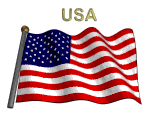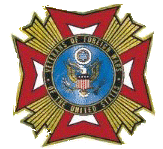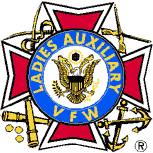|
THE VFW MOTTO
To honor the dead by helping the living
THE HISTORY OF OUR "BUDDY POPPY" CAMPAIGN The Veterans of Foreign Wars of the United States was the first organization to promote a nationwide distribution of poppies assembled by disabled and need veterans. To substantiate this claim, and to dispel any claim to the contrary the following chronological and documentary information is briefly outlined.
In 1921, the Franco-American Children’s League conducted a nationwide distribution of Poppies made in France, for the benefit ofchildren in the war-torn areas of France and Belgium. The inspiration came from Col. John McCrae’s poem, "In Flanders Fields."
October 1921, the American Legion, at its convention in Kansas City, repudiated its action of 1920 in choosing the poppy as its official flower and substituted the daisy.
In May 1922, the Veterans of Foreign Wars of the United States conducted a nationwide distribution of poppies made in France. This was after the dissolution of the Franco-American Children’s League, and in response to an appeal by Madame Guerin, "the poppy lady from France."
In October 1922, following the first nationwide distribution of poppies by the VFW, the American Legion Convention repudiated the daisy as its official flower and again adopted the poppy.
In the spring of 1923, the American Legion conducted its first nationwide sale of poppies made by a French manufacturer.
In 1923, the VFW evolved the idea which resulted in the VFW "Buddy Poppy" fashioned by disabled and needy veterans who were paid for their work in assembling "Buddy" poppies.
In February 1924, the VFW registered the name "Buddy" Poppy with the U.S. Patent Office, and still holds all trademark rights in the name "Buddy" under the classification of artificial flowers. Since May 1924, the VFW has annually conducted a "Buddy" Poppy campaign |
|
Where are Flanders Fields?
Some of the bloodiest battles of World War I took place in the areas of northern France and southwest Belgium known as Flanders and Picardy.
The British front line was determined to keep the Germans from traversing Flanders and the Ypres river valley to reach the port of Calais. Troops from both sides were holed up in the Ypres salient, an outward projection of the battle line. Defending British troops were vulnerable on three sides; therefore this was a bloody and dangerous place for a soldier to be.
The destruction from the battles in this area reached beyond the battlefield to the towns and roads of the area, and led to the demolition of buildings, roads, and all plant life, leaving only mud.
Where do the poppies come in?
Noticed as early as the Napoleonic Wars, red poppies grew on the graves of dead soldiers in the fields of northern Europe. Evidently, poppy seeds will lie underground for years and bloom if they are plowed up. In the spring of 1915, red poppies flourished in the fields of the Ypres salient covering the newly dug graves.
Where does the poem come in?
The scenes of the spring battles in the Ypres salient moved John McCrae, a Canadian doctor, to write "In Flanders Fields." He wrote the poem as he sat in the dressing area (where wounds were dressed) looking out at a field of graves. The poem was later published in Punch Magazine. McCrae died of pneumonia in 1918, a common killer of Great War soldiers.
Inspired by McCrae's poem, American Moina Michael wore poppies to honor the war dead. She also began to sell poppies to raise money for disabled veterans. After meeting Moina Michael in 1920, Frenchwoman Madame E. Guerin started selling handmade poppies to raise money for poor children who were living in the aftermath of the Great War. Soon thereafter Field-Marshall Earl Haig, the former British Commander-in-Chief, encouraged the selling of paper poppies to raise funds for veterans. This tradition spread to Canada and then to the United States.
|
In Flanders Fields
|
|


